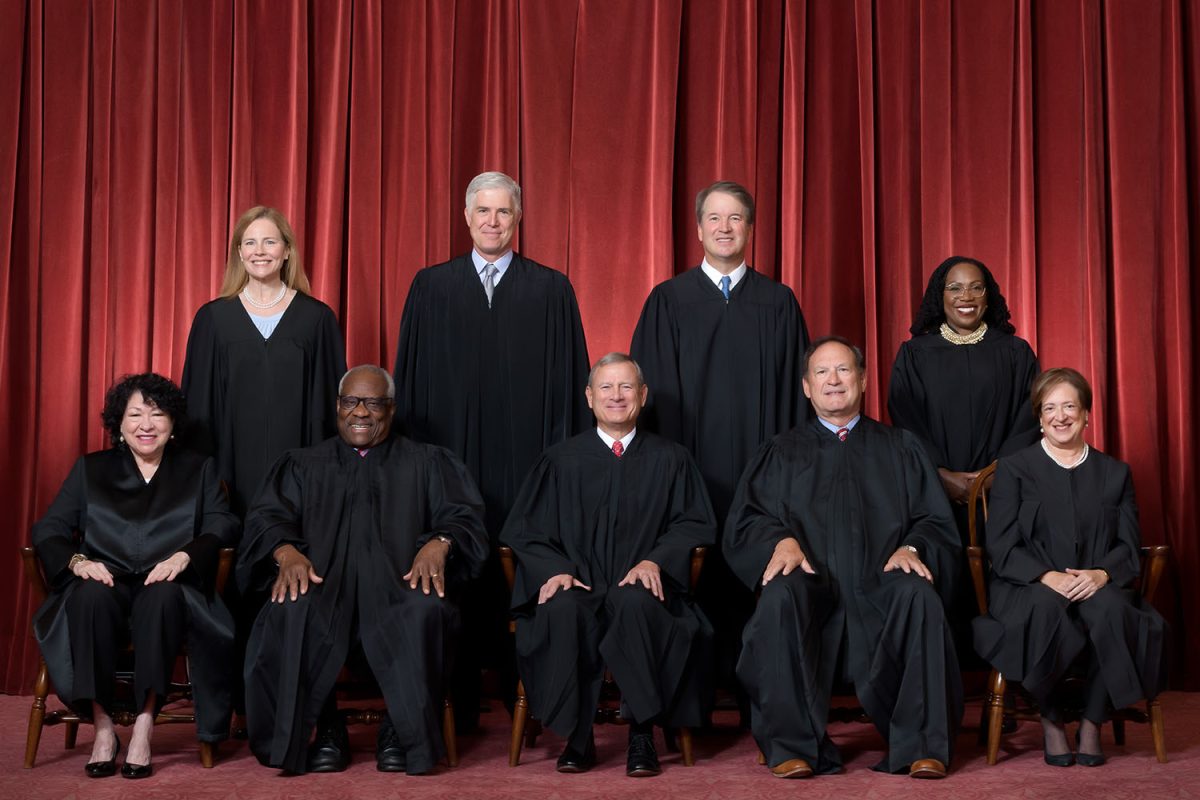This past semester, I took a course within the law, criminal justice and society department where we discussed recent and upcoming Supreme Court cases and what future questions will be answered by the highest court in the nation. We covered many topics related to things like voting rights and due process, but also subjects like assistive reproductive technologies and marijuana legalization.
For decades, many could count on SCOTUS for providing the momentum and foundation for countless civil rights movements. We can look at Brown v. Board of Education and all it did for Black Americans by desegregating schools. We can turn to Griswold v. Connecticut and how it legalized contraceptives and created a precedent to the unenumerated right to privacy in the constitution. Or, more recently, we can look to Lawrence v. Texas, which ruled that same-sex sodomy and relations did not violate the Constitution, effectively overruling Bowers v. Hardwick and paving the way to legalized same-sex marriage with Obergefell v. Hodges.
Obergefell, the case that required states to recognize same-sex marriage, was as recent as 2015. So what has happened to the Supreme Court since? Why have cases like Dobbs v. Jackson, 303 Creative LLC v. Elenis and Students for Fair Admissions v. Harvard taken the country by storm, stripping people of their rights and threatening others in the process?
Prior to 2015, the Supreme Court of the United States was led by a progressive majority who often supported civil rights litigation and had a more liberal stance on many topics. But in 2016 this all changed. President Barack Obama, who was still in office at the time, sought to replace Justice Antonin Scalia, who had passed away while still serving on the bench, with current Attorney General Merrick Garland. At the time of the nomination, the 2016 election was eight months away. The Senate majority leader at the time, Mitch McConnell, however, felt that it was not appropriate to put a new justice on the stand in an election year and never filed Obama’s nomination. He wanted whomever the new president would be to choose the new Supreme Court justice. He is quoted as saying that this move was “about a principle, not a person.”
The Democrats’ defeat on this issue led to the switch on the Supreme Court. Conservative President Donald Trump was able to nominate not one, but three new SCOTUS justices. Most frustrating was Justice Amy Coney Barrett’s nomination to the bench, which took place within a month of the 2020 election. In 2016, Senator Lindsay Graham from South Carolina said if a seat were to open in 2020, he would not let the current sitting president nominate a replacement. He went back on his word with Justice Ruth Bader Ginsburg’s death mere days before the election in 2020, supporting Donald Trump’s nomination of Barrett.
Since the Republican win in 2016 and their subsequent appointees, the Supreme Court has become the most conservative and religious it has ever been since World War II. And with their conservatism comes a new kind of test many justices have used to justify their recent decisions — the History and Traditions test.
This is the test that was used to overturn Roe v. Wade in Dobbs v. Jackson Women’s Health Clinic and decimate or threaten other civil rights for years now. Essentially, the History and Traditions test asks whether there is a deeply rooted history or tradition of certain acts and behavior throughout America’s past. If there isn’t, then many of the conservative justices believe they have the precedent and grounds to rule in opposition to the civil rights and liberties many Americans depend on, working against many rulings set by earlier courts.
In Dobbs, the majority opinion found that there is no history or tradition of abortion in America’s past — despite Roe being ruled 50 years ago — and declared abortion as no longer a constitutionally protected right. In New York State Rifle & Pistol Association v. Bruen, SCOTUS found there to be no historical tradition of gun regulations that required people to show cause to carry a concealed weapon and overruled New York’s law. If SCOTUS determines there is no historical tradition of such behavior or law in the US, they can call countless other cases into question. This includes things like same-sex marriage and access to contraceptives — even interracial marriage and gun regulations could all be dismantled by the Supreme Court we have now.
While this is having substantial effects at the federal level, we are seeing this test trickle down to lower courts as well. In Mississippi, a judge ruled in the case United States v. Bullock that Jessie Bullock, a convicted felon, is allowed to own firearms as there is no history within the United States of such regulation existing, essentially ignoring the federal Felon in Possession law that makes it a crime for felons to own guns. While the judge noted that this ruling is solely for Bullock and does not get rid of the Felon in Possession law, who is to say that other courts and states won’t use the same logic? After all, they used the same logic in Bruen to make such a decision at the federal level.
If we were to use the Supreme Court’s test throughout history, many important cases would not have been ruled the way they were. In Brown v. Board of Education, there was no historical tradition of desegregated schools and amenities, but the justices thought it was important enough of an issue to rule otherwise and say that it violated the 14th amendment. There was no historical tradition that congressional districts had to be equal and redistricted fairly, but SCOTUS ruled otherwise in Baker v. Carr. These justices focused on the laws and constitutional amendments such topics violated — they didn’t focus on whether their grandparents’ grandparents discriminated against Black Americans and gerrymandered congressional districts so urban areas got no voting power. While originalism has always been a judicial theory, and has traditionally been a prominent one within the Supreme Court, SCOTUS has taken it to the extremes with their History and Traditions test.
Tell me why we need to rely on our third-, fourth- and fifth-removed ancestors to determine our rights? The same people that couldn’t fathom the idea of the telephone or consider the fact that guns may one day shoot dozens of bullets a minute are determining our future here in this country.
This form of originalism is dangerous and decimating civil rights countless lawyers and advocacy leaders have been working to protect for years. The future feels bleak with so many pivotal cases being threatened simply because there is no history or tradition of them in our nation’s history. SCOTUS needs to begin looking to the future rather than the past.
While previous generations can teach us countless lessons and inform us on how to act, in no way should they be shaping our future. Only the current generations should decide that. Only we know what is best for ourselves and our future, not some old white man that used to lead this country and certainly not a bunch of old conservatives on the Supreme Court who have a job and life so far removed from the people and problems many of us face.
Livia LaMarca is the assistant editor of the opinions desk who misses using the Oxford comma. She mostly writes about American political discourse, US pop culture and social movements. Write to her at [email protected] to share your own opinions!




